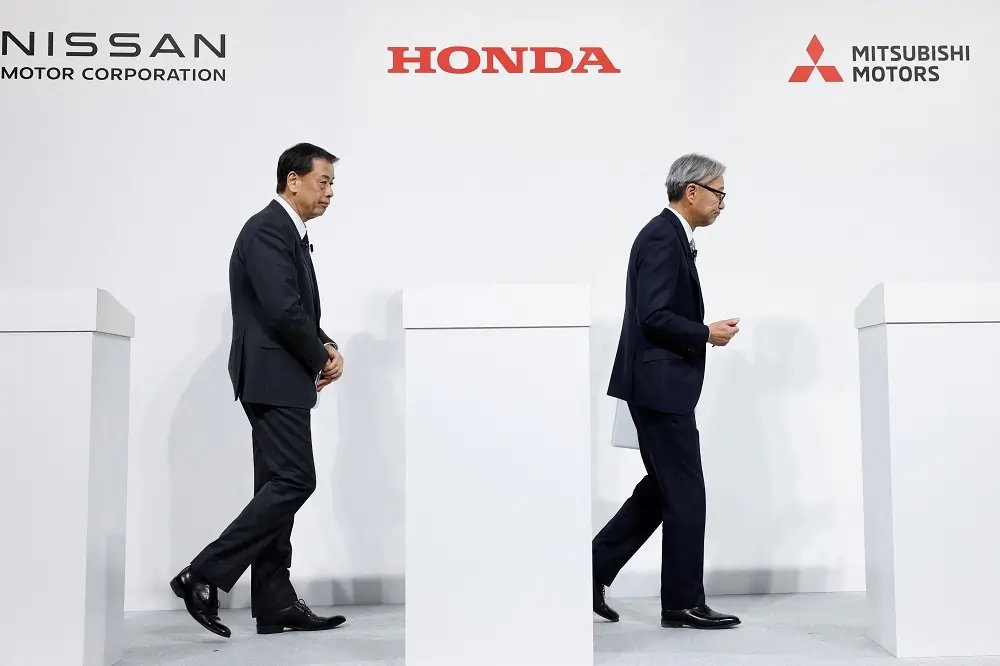Honda, Nissan aim to merge by 2026 in historic pivot
Published by Jessica Weisman-Pitts
Posted on December 23, 2024
4 min readLast updated: January 27, 2026

Published by Jessica Weisman-Pitts
Posted on December 23, 2024
4 min readLast updated: January 27, 2026

By Kantaro Komiya
TOKYO (Reuters) – Honda and Nissan are in talks to merge by 2026, they said on Monday, a historic pivot for Japan’s auto industry that underlines the threat Chinese EV makers now pose to the world’s long-dominant legacy car makers.
The tie-up would create the world’s third-largest auto group by vehicle sales after Toyota and Volkswagen.
It would also give the two companies scale and a chance to share resources in the face of intense competition from Tesla and more nimble Chinese rivals, such as BYD.
The merger of Honda, Japan’s second-largest automaker, with Nissan, its No. 3, would be the biggest reshaping in the global auto industry since Fiat Chrysler Automobiles and PSA merged in 2021 to create Stellantis in a $52-billion deal.
Smaller Mitsubishi Motors, in which Nissan is top shareholder, was also considering joining and would make a decision by the end of January, the companies said.
The chief executives of all three held a joint press conference in Tokyo.
“The rise of Chinese automakers and new players has changed the car industry quite a lot,” said Honda CEO Toshihiro Mibe, citing technological trends of electrification and autonomous driving.
“We have to build up capabilities to fight with them by 2030, otherwise we’ll be beaten.”
The two companies would aim for combined sales of 30 trillion yen ($191 billion) and operating profit of more than 3 trillion yen through the potential merger, they said.
They aimed to wrap up talks around June 2025 before setting up a holding company by August 2026, when shares of both companies would be delisted.
Honda, which has a market capitalisation of more than $40 billion, roughly four times that of Nissan, will appoint the majority of the company’s board, they said.
Combining with Mitsubishi Motors would take the Japanese group’s global sales to more than 8 million cars. The current No. 3 is South Korea’s Hyundai and Kia.
Honda and Nissan have been exploring ways to bolster their partnership, including a merger, Reuters reported last week.
In March, both said they were considering co-operation on electrification and software development. They widened the collaboration to Mitsubishi Motors in August.
Last month, Nissan announced a plan to cut 9,000 jobs and 20% of its global production capacity after sales plunged in the key China and U.S. markets.
Honda also reported worse-than-expected earnings due to a China sales slump, although solid motorcycle and hybrid car businesses helped it secure a relatively stable financial base.
“This is not a rescue of Nissan,” however, Honda’s Mibe said, adding that Nissan’s business turnaround was a “prerequisite” for the merger.
Like other foreign carmakers, Honda and Nissan have lost ground in the world’s biggest market China to BYD and other domestic makers of electric and hybrid cars loaded with innovative software.
In a separate online press conference on Monday, former Nissan chairman Carlos Ghosn, now wanted in Japan as a fugitive for jumping bail and fleeing to Lebanon, said he did not believe the Honda-Nissan alliance would be successful, as the two were automakers were not complementary.
French automaker Renault, Nissan’s largest shareholder, said it would “discuss with Nissan and consider all possible options”. Sources have said Renault is open in principle to a Honda-Nissan tie-up.
Taiwan’s Foxconn, seeking to expand its nascent EV contract manufacturing business, approached Nissan about a bid but the Japanese company rejected it, sources have told Reuters.
Foxconn decided to pause the approach after it sent a delegation to meet with Renault in France, Bloomberg News said on Friday.
Nissan chief executive Makoto Uchida, at Monday’s press conference, denied a view that Foxconn’s move prompted its merger talks with Honda.
Uchida said Nissan continued to work with Renault on a “project basis” if there was synergy, while Mibe said Honda would not change its relations with General Motors.
Shares in Honda ended the day up 3.8%, Nissan rose 1.6% and Mitsubishi Motors gained 5.3% after news of the merger plan, while the benchmark Nikkei index closed up 1.2%.
($1=156.6600 yen)
(Reporting by Kantaro Komiya; Additional reporting by Maki Shiraki and Sakura Murakami in Tokyo and Dominique Patton in Paris; Writing by David Dolan; Editing by Tomasz Janowski and Clarence Fernandez)
A merger is a business strategy where two companies combine to form a single entity, often to enhance competitiveness, expand market share, or achieve operational efficiencies.
The automotive industry encompasses all businesses involved in the design, development, manufacturing, marketing, and selling of motor vehicles, including cars, trucks, and motorcycles.
Corporate strategy refers to the overall plan and direction a company takes to achieve its long-term goals, including decisions on mergers, acquisitions, and resource allocation.
Investment opportunities are chances for individuals or organizations to invest capital in various assets, such as stocks, bonds, or real estate, with the expectation of generating a return.
Explore more articles in the Business category











